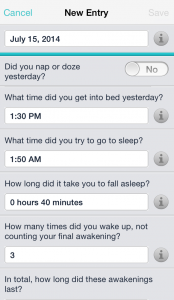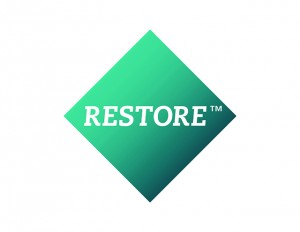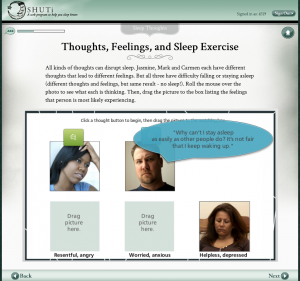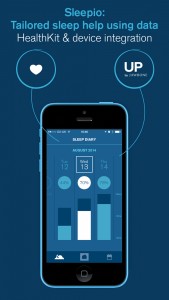6 Online Options for Insomnia Therapy.

There aren’t enough practitioners of cognitive behavioral therapy for insomnia (CBT-I) to allow for all sufferers in need of the gold-standard treatment to get in-person help, but online programs can fill some patients’ needs. We profile online CBT-I options, including the peer-reviewed research that supports their programs, their effectiveness data, and price points.
CBTforInsomnia.com
Information source: Gregg D. Jacobs, PhD
Launched: 2005
Created by: Jacobs, a CBT-I and sleep specialist, based on his 20 years of research and clinical practice in sleep medicine at Harvard Medical School.
Development: CBTforInsomnia.com was developed from Jacobs’ research (see “Peer-reviewed research” below), which was funded by the National Institutes of Health and demonstrated that a similar CBT-I program was more effective than Ambien.
Peer-reviewed research: Jacobs GD, Pace-Schott E, Stickgold R, Otto M. Cognitive-behavioral therapy and pharmacotherapy for insomnia: a randomized controlled trial and direct comparison. Arch Intern Med.2004;164:1888-96.
Because CBTforInsomnia.com is a direct-to-consumer program, it cannot be subjected to controlled research, and there are no peer-reviewed articles on this specific program.
Effectiveness: A systematic outcome analysis on the program demonstrates the following results: 85% report improved sleep or a reduction in sleeping pills; 80% report a reduction in sleeping pills, averaging at least 66% fewer pills, and 40% stop sleeping pills altogether; 70% report an increase in total sleep time that averages one additional hour of sleep per night; 85% report a reduction in the number of insomnia nights that averages at least 70% fewer insomnia nights (from almost 6 nights per week at the start of the program to less than 2 nights per week 4 weeks later).
In 9 years of business, only two customers have requested a refund.
Referrals typically from: We do not collect that data, but it is a combination of both physician referrals and self-referrals.
Price: $34.95 per user (for permanent use)
Additional information: This CBT-I program provides weekly personalized feedback and CBT guidelines directly from a recognized CBT-I expert, contains techniques for reducing sleep medications, and offers a simple, easy-to-use format for a nominal price.
CBT-i Coach
Information source: Julia Hoffman, PsyD, national director, Mobile Health in Mental Health Services, US Department of Veterans Affairs (VA)
Launched: June 2013
Created by: CBT-i Coach represents a collaboration between the VA’s National Center for PTSD, Stanford University Medical Center, and the Department of Defense’s National Center for Telehealth & Technology. The team was led by Hoffman. Subject matter experts with deep scientific credibility in the field of insomnia led by Rachel Manber, PhD, at Stanford University, as well as those responsible for the national rollout of this evidence-based practice in the VA system, contributed at every stage of development. Implementation in existing clinical practices was considered continuously throughout design and development of the mobile app, and to this end, pilot studies with expert CBT-I clinicians in VA settings have been undertaken to improve the product iteratively.
Development: CBT-i Coach is based on the therapy manual, Cognitive Behavioral Therapy for Insomnia in Veterans by Rachel Manber, PhD, Leah Friedman, PhD, and Colleen Carney, PhD, et al.
Peer-reviewed research: Studies underway at multiple VA sites.
Effectiveness: This product is not intended to be used independently. It is an adjunct to typical face-to-face care and to be used in conjunction with a skilled clinician who is trained in CBT-I. This app decreases barriers to successful implementation of a well-accepted treatment protocol and supports increased efficiency of care as it enables patients and providers with a few key features beyond traditional care: (1) CBT-I requires constant attention to sleep behaviors and regular accurate reporting on these in order to enable the algorithm-based aspects of the intervention. CBT-i Coach provides simpler, more accurate, and more discreet ways to collect and use the various elements of data necessary to the success of this treatment. (2) CBT-I clinicians are required to do various complex calculations at the start of sessions in order to utilize this data effectively. CBT-i Coach automatically handles these calculations, which reserves time for more valuable patient-provider interactions. (3) CBT-I requires that patients remember various behaviors to practice between sessions for optimal outcomes. CBT-i Coach provides instant and time-independent access to these tools, as well as extra information to support their usage.
Referrals typically from: Of the 30,000 users of CBT-i Coach, most come from physician referrals. A significant proportion of users appear to find this product through online/app store search.
Price: Free (veterans and civilians can download the app)
Additional information: The primary difference between CBT-i Coach and the various alternative digital options that exist is that CBT-i Coach is intended to be used within the context of traditional face-to-face treatment in conjunction with a trained healthcare provider. An integrated healthcare system like the VA is uniquely suited to enable this kind of thorough approach to care given its direct connection with healthcare providers, its opportunities to train them in evidence-based psychotherapies, and its solid technical infrastructure.
Cobalt Therapeutics’ RESTORE
Information source: Brian Keenaghan, senior project manager, Cobalt Therapeutics
Launched: 2006 in Canada; 2011 in the United States
Created by: Norah Vincent, PhD, University of Manitoba
Development: RESTORE is a widely studied sleep improvement program. The paper “Logging on for Better Sleep: RCT of the Effectiveness of Online Treatment for Insomnia,” published in SLEEP, reports on a randomized controlled trial and was published more than 5 years ago.
Peer-reviewed research: Graff LA, Kaoukis G, Vincent N, Piotrowksi A, Ediger J. New models of care for psychology in Canada’s health services. Can Psychol. 2012;53:165-177….Hebert EA, Vincent N, Lewycky S, Walsh K. Attrition and adherence in the online treatment of chronic insomnia. Behav Sleep Med. 2010;8(3):141-50….Holmqvist M, Vincent N, Walsh K. Web- vs telehealth-based delivery of cognitive behavioral therapy for insomnia: a randomized controlled trial. Sleep Med. 2013;15(2):187-195….Vincent N, Lewycky S. Logging on for better sleep: randomized controlled trial of the effectiveness of online treatment for insomnia. Sleep. 2009;32(6):807-15….Vincent N, Lewycky S, Hart Swain K, Holmqvist M. Logging on for nodding off: Empowering patients through the use of computerized cognitive behavioural therapy (cCBT). The Behavior Therapist. 2009;32:123-126….Vincent N, Walsh K, Lewycky S. Sleep locus of control and computerized cognitive-behavioral therapy (cCBT). Behav Res Ther.2010;48(8):779-783….Vincent N, Walsh K. Stepped care for insomnia: an evaluation of implementation in routine practice. J Clin Sleep Med. 2013;9(3):227–234….Vincent N, Walsh K, Lewycky S. Determinants of success for computerized CBT: Examination of an insomnia program. Behav Sleep Med. 2013;11:1-13….Vincent N, Walsh K. Hyperarousal, sleep scheduling, and time in bed as mediators of outcome in computerized cognitive-behavioral therapy (cCBT). Behav Res Ther. 2013;51:161-166.
Effectiveness: Studies have shown that more than 80% of those who try the program improve and show significant improvement in the time it takes to fall asleep, the time they are awake in the middle of the night, the amount of sleep they get, and their productivity at work.
Referrals typically from: Clinicians, employers, and insurers.
Price: Varies based on use case and situation
Additional information: RESTORE has been studied in individuals with many common comorbid conditions including those with sleep apnea and restless legs. It is available in Spanish and English. It is also available with other well-studied programs for anxiety, depression, and other common comorbid problems.
SHUTi
Information source: Mary B. Grove, VP sales and marketing, and Frances Thorndike, PhD, chief science officer
Launched: Commercial offering in March 2012 when BeHealth Solutions licensed SHUTi from the University of Virginia
Created by: Four clinical researchers: Lee Ritterband, PhD; Frances Thorndike, PhD; Linda Gonder-Frederick, PhD; and Charles Morin, PhD. Morin is ranked as an insomnia expert with expertise in CBT-I.
Development: Originally informed by many years of Morin’s work with insomnia and CBT for insomnia (sample publications below), as well as Ritterband’s formative work defining Internet interventions and providing a model for how to develop and evaluate Internet interventions.
Morin CM, Culbert JP, Schwartz SM. Nonpharmacological interventions for insomnia: a meta-analysis of treatment efficacy. Am J Psychiatry.1994;151(8):1172-1180…..Morin CM, Colecchi C, Stone J, Sood R, Brink D. Behavioral and pharmacological therapies for late-life insomnia, a randomized controlled trial. JAMA. 1999;281(11):991-999….Morin CM, Bastien CH, Vallieres A. Validation of the Insomnia Severity Index as an outcome measure for insomnia research. Sleep Med. 2001;2(4):297–307….Ritterband LM, Gonder-Frederick LA, Cox DJ, Clifton AD, West RW, Borowitz SM. Internet interventions: In review, in use, and into the future. Professional Psychology: Research and Practice. 2003;34(5):527–534….Ritterband LM, Thorndike FP, Cox DJ, Kovatchev BP, Gonder-Frederick L. A behavior change model for Internet interventions. Ann Behav Med.2009;38(1):18-27.
Peer-reviewed research: Thorndike FP, Saylor DK, Bailey ET, Gonder-Frederick LA, Morin CM, Ritterband LM. Development and perceived utility and impact of an Internet intervention for insomnia. E-Journal of Applied Psychology. 2008;4(2):32-42….Ritterband LM, Thorndike FP, Gonder-Frederick L, et al. Efficacy of an Internet-based behavioral intervention for adults with insomnia. Arch Gen Psychiatry. 2009;66:692-698….Ritterband LM, Thorndike FP, Gonder-Frederick L, et al. Can cognitive behavioral therapy of insomnia be effectively provided via an Internet-based program? Best of Sleep Medicine.2009, 2010….Ritterband LM, Bailey ET, Thorndike FP, Lord HR, Farrell-Carnahan L, Baum LD. Initial evaluation of an Internet intervention to improve the sleep of cancer survivors with insomnia. Psychooncology. 2012;21(7):695-705….Thorndike FP, Ritterband LM, Morin CA, et al. Randomized controlled trial of an Internet intervention for adults with insomnia: effects on comorbid psychological and fatigue symptoms. J Clin Psychol. 2013;69(10):1078–1093.
Effectiveness: The evidence base suggests that SHUTi is effective for the vast majority of users. Of the most recent 500 users, over 70% of users who started the program either fully completed the program or met criteria for mild or no clinical insomnia based on the Insomnia Severity Index at their last log-in.
Referrals typically from: Distributed equally between physician referral and self-referral.
Price: Clinicians can join the SHUTi Clinical Partner Network to gain their patients a 15% discount to the published $156 subscription rate for SHUTi Professional, which enables patients to grant their referring physician online access to view and monitor their progress with SHUTi; otherwise, $135 one-time fee per user in the self-help program.
Additional information: SHUTi is recommended by over 135 leading sleep clinics. It has an exclusive partnership with Welltrinsic, the network of sleep providers founded by the American Academy of Sleep Medicine. SHUTi was also reviewed by an independent expert panel and selected for inclusion in the National Cancer Institute’s Research-tested Intervention Programs (RTIPs). Clinicians have also voiced support of the Clinical Partner feature whereby they can view their patient’s progress (program usage and sleep diary information). Continued evaluation of SHUTi in different research trials adds to its credibility among clinicians.
Sleepio
Information source: Peter Hames, CEO and cofounder
Launched: 2012
Created by: Co-created by insomnia suffer Peter Hames and sleep expert Colin Espie, PhD. Hames holds a master’s degree in experimental psychology from the University of Oxford and overcame his insomnia using techniques refined by Espie. His difficulty in getting access to proven nondrug techniques inspired him to create Sleepio. Espie, clinical and scientific director and professor at the Sleep & Circadian Neuroscience Institute, University of Oxford, has 200 published scientific papers.
Development: Sleepio was developed through the huge body of existing literature, as well as Espie’s 30 years of clinical and research experience.
Peer-reviewed research: Espie CA, Kyle SD, Williams C, et al. A randomized, placebo-controlled, trial of online cognitive behavioral therapy for chronic insomnia disorder delivered via an automated media-rich web application. SLEEP. 2012;3:769-781.
Effectiveness: For retail consumers, we offer a 100% money back guarantee.
Referrals typically from: A number of channels—from searching on Google to physician referral.
Price: $1,000 per month for unlimited subscriptions for your patients; alternately, a 30% discount off the listed price of $149 per user for 12 weeks’ access and $249 per user for 1 year’s access is available to healthcare providers for referred patients
Additional information: Clinical excellence; world-leading clinical team (University of Oxford); gold standard evidence (placebo-group RCT); designed to feel more like entertainment than medicine; the whole program is presented by a virtual animated sleep expert, The Prof, and his narcoleptic dog, Pavlov; exceptional ease of use for users of any age; integration with sleep trackers (Jawbone UP, Fitbit) to automatically tailor the program using tracked sleep data; proactive and supportive online community of other users; clinician dashboard (Sleepio Clinic) that allows healthcare professionals to remotely monitor their patients as they move through the program.
SleepTutor
Information source: Mike Clark, VP of sales and business development, Sleep960
Launched: 2012
Created by: SleepTutor is based on Somnio, which was developed by Winni Hofman, PhD, a leading insomnia expert and faculty member of the University of Amsterdam.
Development: Hofman coauthored several papers about insomnia treatment and online CBT-I treatment (see “peer-reviewed research” below).
Peer-reviewed research: Hofman WF, Kumar A. Online treatment of insomnia using behavioral techniques. Sleep Diagnosis and Therapy. 2010;5(3):28-32….See additional studies at www.sleeptutor.com/_content/about-sleep-tutor.asp (under “validation”).
Effectiveness: Money back guarantee up to 14 days after initial enrollment.
Referrals typically from: Healthcare professionals only.
Price: $149 per user for 8 sessions; quantity discounts apply for providers willing to commit to a large number of patients
Additional information: Since its launch in 2005, Somnio has helped thousands of patients.
During his research for this article, Los Angeles-based freelancer C.A. Wolski was gratified to learn that there are nonpharmaceutical options for treating insomnia and, particularly, that these treatments can be easily accessible to most patient populations.









